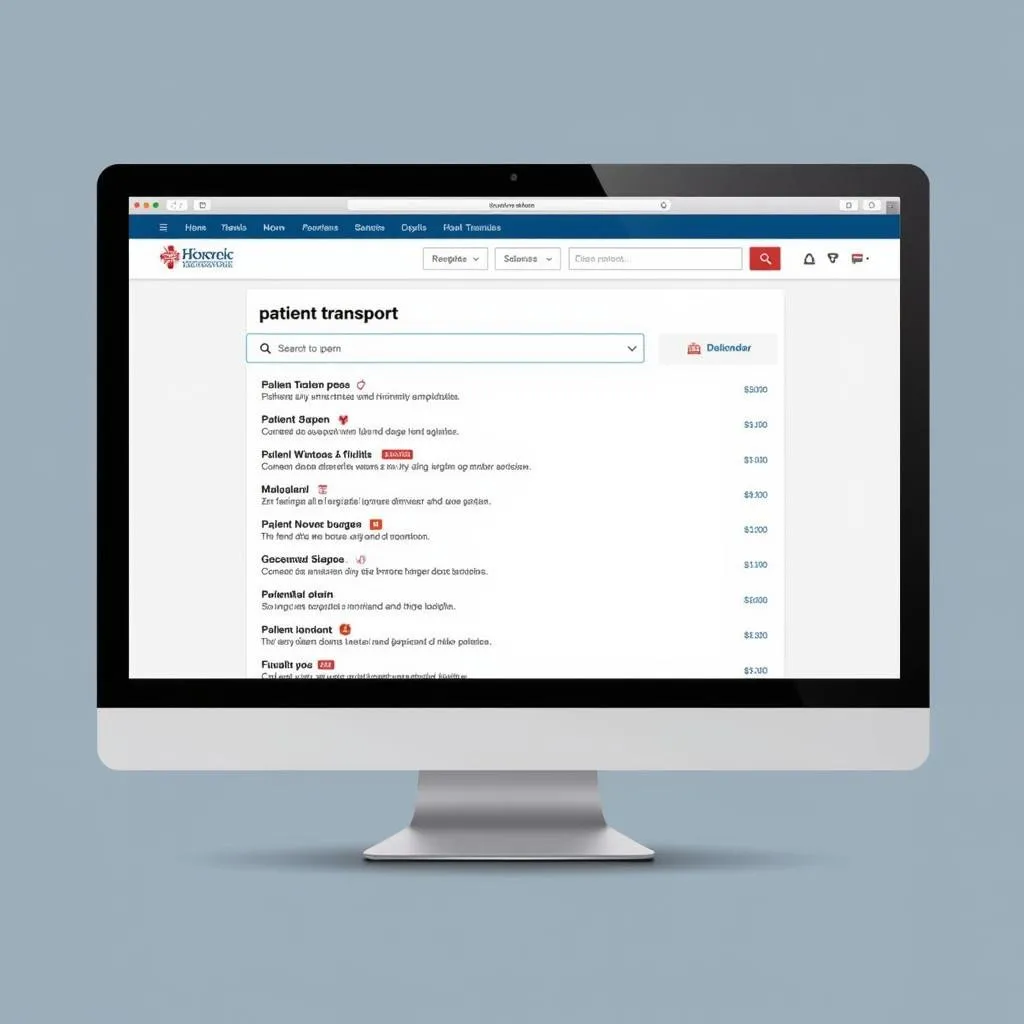Patient Transport Jobs In Hospitals are essential for ensuring the smooth operation of any healthcare facility. These dedicated professionals play a vital role in moving patients safely and efficiently between different departments for tests, procedures, and treatments. If you’re seeking a rewarding career that combines your compassion for others with your ability to provide crucial support within a hospital setting, then a patient transport job might be the perfect fit for you.
Understanding the Importance of Patient Transport
Imagine a patient arriving at the hospital for an X-ray or needing to be transferred to surgery. Without a dedicated team to facilitate these moves, delays could occur, impacting patient care and satisfaction. Patient transporters are the crucial link ensuring timely and comfortable transportation, directly contributing to positive patient outcomes.
Different Types of Patient Transport Jobs
While the core function of moving patients remains consistent, there are various roles within the patient transport department:
- Transporter: This entry-level position involves moving patients between departments using wheelchairs, stretchers, or beds.
- Emergency Room Transporter: These individuals specialize in transporting patients within the fast-paced environment of the emergency room.
- Operating Room Transporter: This role involves transporting patients to and from operating rooms, requiring knowledge of surgical protocols.
- Dispatcher: Dispatchers coordinate transport requests, assign transporters, and manage patient flow within the hospital.
 Patient Transport Team
Patient Transport Team
Key Skills for Success in Patient Transport
While specific requirements may vary between hospitals, certain skills are universally sought after:
- Physical Stamina: Moving patients, equipment, and navigating a busy hospital requires physical strength and endurance.
- Communication Skills: Clear and empathetic communication with patients, nurses, and other medical staff is essential.
- Attention to Detail: Following safety protocols, ensuring patient comfort, and accurately completing paperwork are crucial aspects of the job.
- Teamwork: Patient transport often requires collaboration with nurses, orderlies, and other transporters.
- Compassion and Empathy: Interacting with patients who may be anxious, in pain, or disoriented necessitates a caring and understanding approach.
The Rewards of a Patient Transport Career
Beyond the satisfaction of providing an essential service, patient transport jobs offer:
- Entry-Level Opportunities: Many positions require minimal experience, making it an accessible career path.
- On-the-Job Training: Hospitals often provide comprehensive training programs for new hires.
- Career Advancement: With experience and additional certifications, transporters can pursue roles with more responsibility and higher pay.
- Job Security: The demand for healthcare professionals, including patient transporters, remains consistently high.
Finding Patient Transport Jobs
- Hospital Websites: Most hospitals advertise job openings, including patient transport positions, on their career pages.
- Online Job Boards: Websites like Indeed, Monster, and CareerBuilder frequently list healthcare-related jobs.
- Networking: Attending healthcare job fairs or connecting with professionals in the field can lead to potential opportunities.
 Searching Online Job Boards for Patient Transport Jobs
Searching Online Job Boards for Patient Transport Jobs
Tips for Your Patient Transport Job Search
- Tailor Your Resume: Highlight relevant skills like physical ability, communication, and attention to detail.
- Prepare for Your Interview: Research common interview questions and practice your answers, focusing on your passion for patient care and your understanding of the transporter’s role.
- Express Your Enthusiasm: Let your genuine interest in the field and your willingness to learn shine through during the interview process.
A Rewarding Career Path Awaits
Patient transport jobs in hospitals offer a meaningful way to contribute to the well-being of others. By combining your compassion and dedication with the necessary skills and training, you can embark on a fulfilling career path that makes a real difference in the lives of patients every day.
Frequently Asked Questions
1. What is the average salary for a patient transporter?
Salaries can vary based on location, experience, and the specific hospital. However, the average hourly wage for patient transporters in the United States is around $15-$20 per hour.
2. What are the physical demands of being a patient transporter?
Patient transporters are frequently on their feet, lifting and moving patients, pushing wheelchairs and stretchers, and navigating a busy hospital environment. A certain level of physical fitness is required.
3. What are some career advancement opportunities for patient transporters?
With experience and additional training, transporters can pursue roles such as lead transporter, dispatcher, or even move into other areas of healthcare like patient care technician or emergency medical technician (EMT).
4. What is the work schedule typically like for patient transport jobs?
Hospitals operate 24/7, so patient transport jobs often involve working shifts that include evenings, weekends, and holidays.
5. Do I need any certifications to become a patient transporter?
While not always required, obtaining certifications like Basic Life Support (BLS) or Certified Patient Care Technician (CPCT) can enhance your qualifications and make you a more competitive candidate.
Need Support? Contact Us!
For any inquiries or assistance, please reach out to us at Phone Number: 02437655121, Email: [email protected] or visit us at Address: Số 298 Đ. Cầu Diễn, Minh Khai, Bắc Từ Liêm, Hà Nội, Việt Nam. Our dedicated customer service team is available 24/7 to assist you.